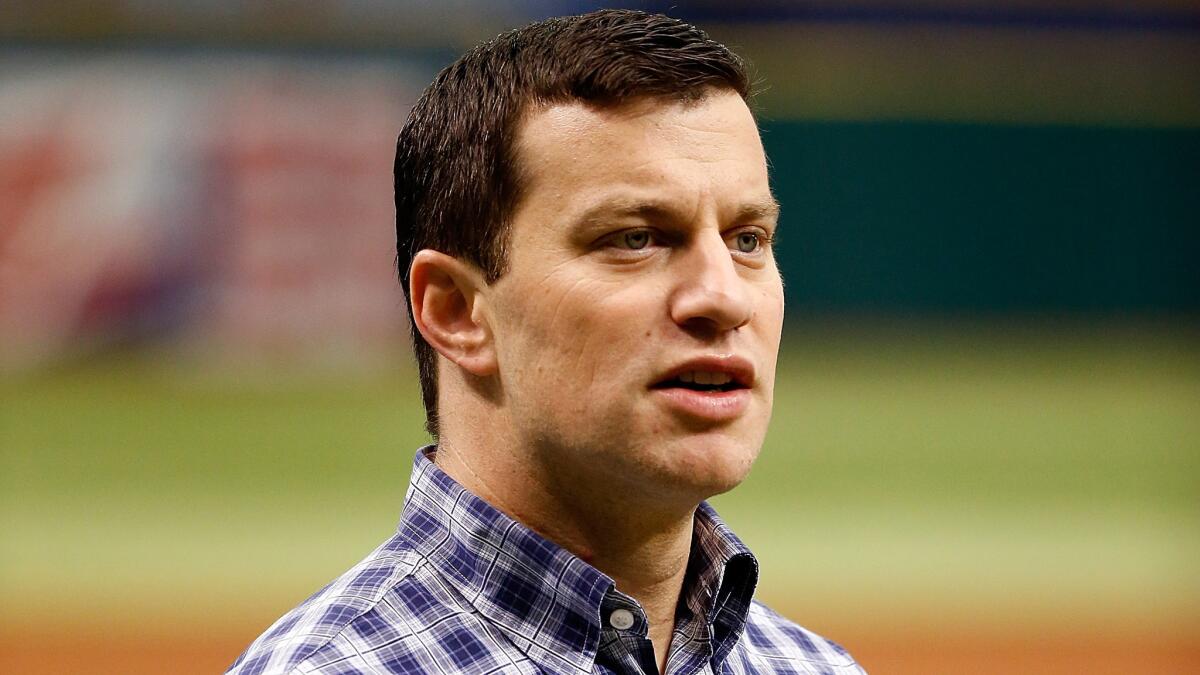Dodgers’ hiring of executive Andrew Friedman signals a cultural shift

- Share via
A week after the abrupt end to one of their most disappointing postseasons, the Dodgers made a move that could change a culture.
Andrew Friedman, a 37-year-old former investment banker who built the Tampa Bay Rays into perennial contenders with low payrolls and plentiful statistics, is in.
Ned Colletti, an old-school guy who spent nine Dodgers seasons hanging around batting cages in his cowboy boots, is out.
Friedman has been hired as the Dodgers’ director of baseball operations, the team announced Tuesday. Colletti, the former general manager, was exiled to the position of senior advisor.
“None of us were ready for our season to end. It kind of came up and caught us by surprise,” Dodgers Chief Executive Stan Kasten said during an afternoon meeting with reporters. “When I saw that we were going to have an opportunity to really make us better, deeper, I thought it was something I should really pursue. . . . And I couldn’t be happier to announce Andrew was joining us.”
Friedman, who will be formally introduced to his new team later, led the low-budget Rays to a World Series appearance and four playoff appearances in the nine years he served as the team’s baseball boss. He is a leading proponent of the empirical analysis of baseball statistics known as, “sabermetrics,” which makes him the polar opposite of Colletti, who often judged players on gut instincts and scouting reports.
Colletti’s methods helped keep the Dodgers afloat during the last tumultuous days of owner Frank McCourt, and two seasons ago he seemed to be the perfect fit for Guggenheim Baseball Management, the new Dodgers ownership group that spent lavishly to win back alienated fans and regain a city’s attention.
But while Colletti helped bring the Dodgers five playoff appearances in his nine years, he didn’t always spend wisely, resulting in expensive signings of benched outfielder Andre Ethier and underachieving relief pitchers Brian Wilson, Brandon League and Chris Perez.
The Dodgers’ roster, particularly the bullpen, was exposed as overpaid and poorly built in the team’s recent three-games-to-one defeat by the St. Louis Cardinals in the National League division series.
With the Dodgers’ record $240-million payroll having failed to reach the World Series in consecutive seasons, their owners’ focus has changed, and now the baseball brain trust will change with it.
“Over time, we expect to become that homegrown, player-development-based organization,” said Kasten, who led the Atlanta Braves to consistent playoff appearances in the 1990s with this philosophy. “Along with that, along with being homegrown, along with being younger, you wind up with payroll that’s less.”
The Dodgers are betting that fans are so upset at recent failures that they will accept a smaller payroll and fewer stars for more consistent chances at championships.
Few baseball executives have done more with less than Friedman, whose Rays advanced to the World Series in 2008 with the 29th-ranked payroll among 30 major league teams. Friedman has long been considered one of the brightest minds in the game, an expert in building a team with homegrown players, smart money decisions and progressive statistics. It’s a system that was made famous by the success of the Oakland Athletics and General Manager Billy Beane, who was featured in a popular book and movie titled “Moneyball.”
The Dodgers attempted this sort of culture change once before, in 2004, when McCourt gave the general manager job to Paul DePodesta, then 31 and one of Beane’s assistants in Oakland. The era lasted all of two seasons. DePodesta proved too young and inexperienced to handle a team in the Los Angeles market.
Friedman will have the advantage of age, previous success and, of course, a Dodgers team that won 94 games and was expected to challenge for a World Series championship.
The Dodgers already have a core of established stars such as pitchers Clayton Kershaw and Zack Greinke, first baseman Adrian Gonzalez and outfielder Matt Kemp, as well as one of baseball’s most exciting players in the mercurial Yasiel Puig, a favorite of ownership who will be given at least another season to mature. Friedman will also have three of baseball’s top prospects in outfielder Joc Pederson, shortstop Corey Seager and pitcher Julio Urias.
Beyond that small group, it seems, no Dodgers player is safe under the direction of an executive who has not been afraid to ship out high-priced stars for valuable prospects. This summer he traded Cy Young Award-winning pitcher David Price to the Detroit Tigers.
Don Mattingly will remain as Dodgers manager for another season, but he was hired by Colletti, and his survival will depend on his ability to adjust to Friedman’s metrics. If Mattingly struggles, on deck could be respected Rays Manager Joe Maddon, a former Angels coach.
Expect the Dodgers outfield jam to disappear with a trade involving Ethier or Carl Crawford, or both. There seems to be zero chance Friedman would re-sign injury-prone shortstop Hanley Ramirez, a free agent. And the bullpen could be completely reworked around closer Kenley Jansen.
Everything will reevaluated based on analytics.
“I think more and more that’s becoming a part of baseball front offices,” Kasten said. “And I think over time, teams that lag behind are going to fall behind. But in fairness to Andrew, he doesn’t view himself as a numbers guy. He thinks success requires healthy doses of any tools you can have.”
Friedman will have all sorts of personnel tools. He will have a deep and rich foundation. He will be the director of “Moneyball meets Money, Money, Money Ball,” and the Dodgers are betting big on a blockbuster.
It being 26 years and counting since their last World Series appearance, beleaguered fans can only hope they are right.
More to Read
Are you a true-blue fan?
Get our Dodgers Dugout newsletter for insights, news and much more.
You may occasionally receive promotional content from the Los Angeles Times.











